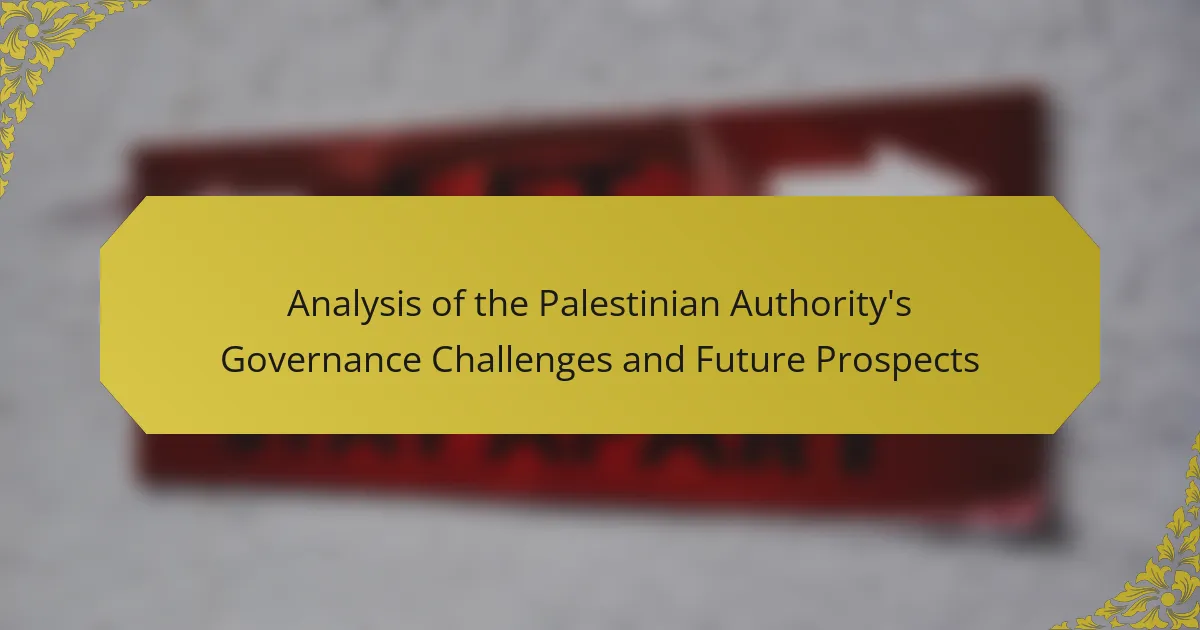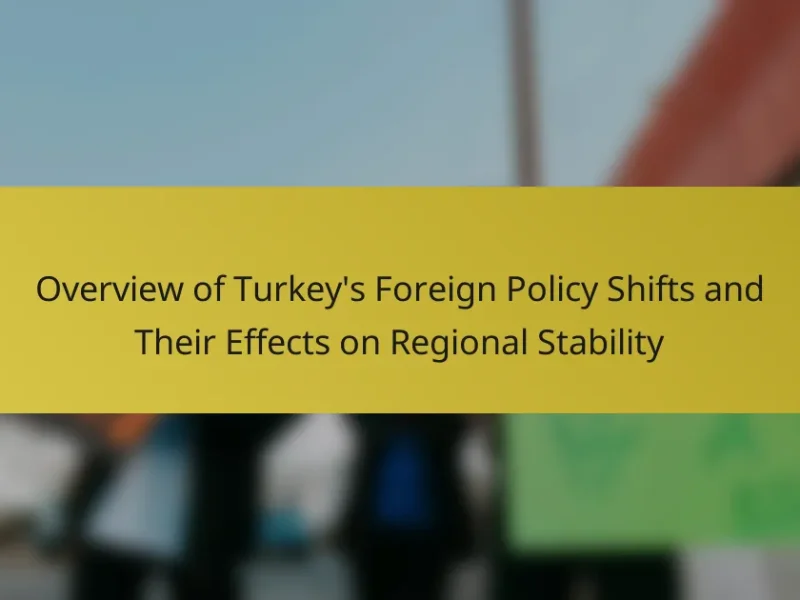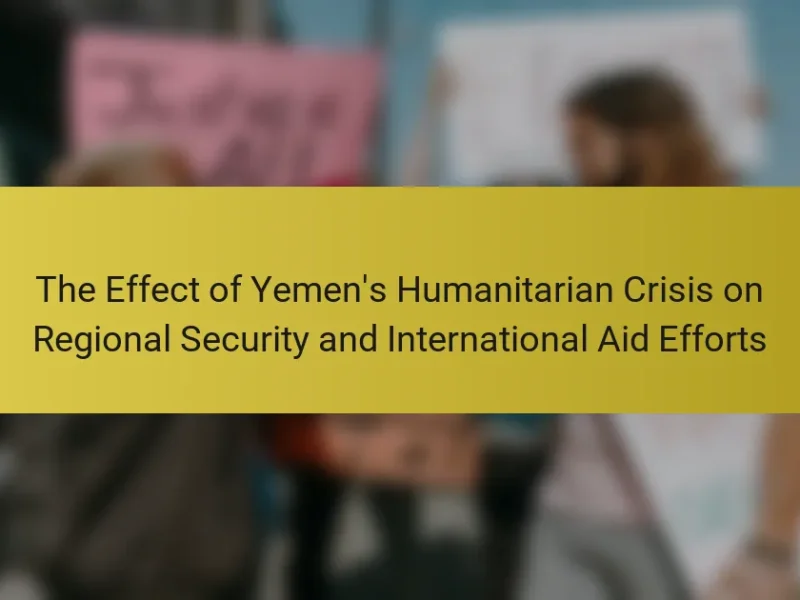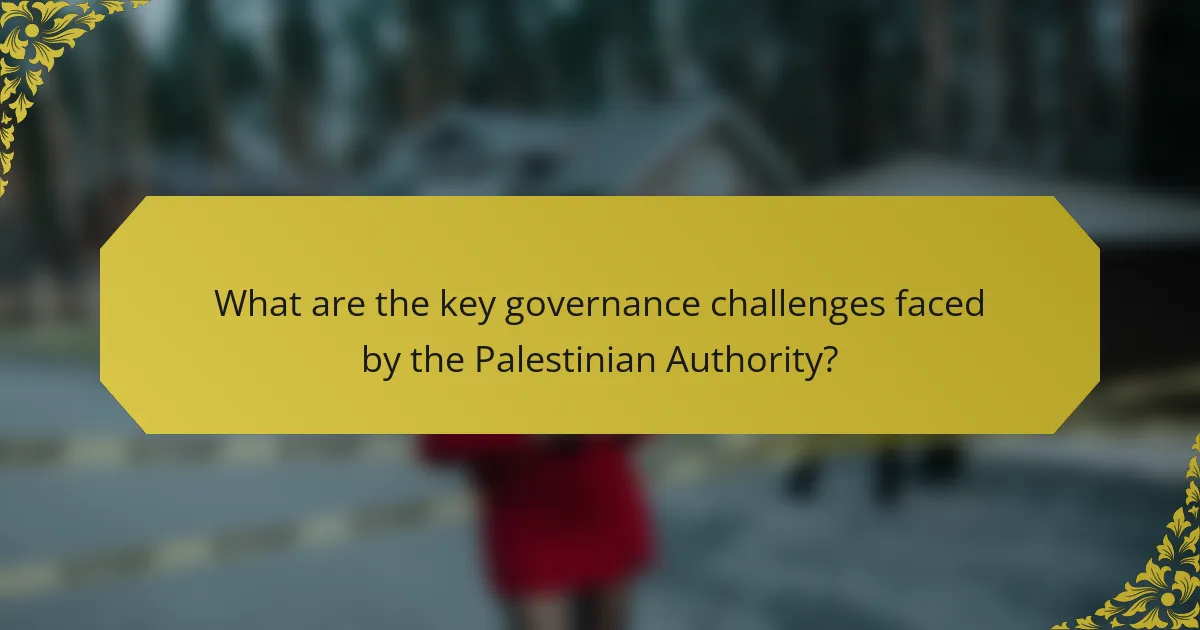
What are the key governance challenges faced by the Palestinian Authority?
The key governance challenges faced by the Palestinian Authority include political fragmentation, economic instability, and limited control over territory. Political fragmentation arises from internal divisions between factions, primarily Fatah and Hamas. This division hampers unified governance and decision-making. Economic instability is evident in high unemployment rates and reliance on foreign aid. Limited control over territory is due to ongoing Israeli occupation and settlement expansion. These challenges undermine the Authority’s legitimacy and effectiveness. According to the World Bank, the Palestinian economy contracted by 11% in 2020, highlighting economic vulnerabilities.
How do political divisions impact the governance of the Palestinian Authority?
Political divisions significantly hinder the governance of the Palestinian Authority. These divisions primarily arise from the rivalry between Fatah and Hamas. This rivalry has led to a split in political control and administrative functions. Fatah governs the West Bank, while Hamas controls Gaza. This division complicates the implementation of cohesive policies across Palestinian territories.
Moreover, political fragmentation limits the Palestinian Authority’s ability to engage effectively with international stakeholders. It undermines public trust in governance, as citizens perceive disunity among their leaders. Consequently, this impacts the Authority’s capacity to address pressing socio-economic issues.
The lack of a unified political front weakens the Palestinian Authority’s negotiating power in peace talks. Historical context shows that previous reconciliation attempts have failed, perpetuating instability. Overall, political divisions create significant obstacles to effective governance within the Palestinian Authority.
What role do internal factions play in governance challenges?
Internal factions significantly contribute to governance challenges within the Palestinian Authority. These factions often have differing political agendas and ideologies. The rivalry between Fatah and Hamas exemplifies this division. Such internal conflicts can lead to fragmented decision-making processes. They also hinder the establishment of a unified governance strategy. Additionally, these factions may prioritize their interests over collective governance goals. This creates obstacles in effective policy implementation. Historical context shows that factionalism has led to political instability and public distrust. Overall, internal factions complicate the Palestinian Authority’s efforts to maintain effective governance.
How does the lack of unity affect policy implementation?
The lack of unity significantly hinders policy implementation. Fragmented governance leads to conflicting agendas among factions. This disunity creates inefficiencies in decision-making processes. Policies may be delayed or blocked due to disagreements. For instance, the Palestinian Authority faces challenges in executing reforms due to internal divisions. Studies indicate that cohesive leadership is crucial for effective governance. Without it, resources are misallocated, and public trust diminishes. Ultimately, the lack of unity results in ineffective policy outcomes.
What economic factors contribute to the governance challenges of the Palestinian Authority?
Economic factors significantly contribute to the governance challenges of the Palestinian Authority. High unemployment rates, estimated at around 25%, hinder economic stability. Limited access to resources and markets due to restrictions affects revenue generation. Dependence on foreign aid, which constitutes over 70% of the PA’s budget, creates vulnerability. The informal economy, accounting for a large portion of economic activity, lacks regulation and oversight. Inflation and rising costs of living further strain public services and governance. Additionally, political instability discourages investment and economic growth. These factors collectively undermine the PA’s ability to govern effectively and maintain public trust.
How does economic dependency on foreign aid influence governance?
Economic dependency on foreign aid significantly influences governance by creating a reliance on external funding for political stability. This reliance can lead to weakened state institutions as local governance may prioritize donor interests over citizens’ needs. When a government is dependent on foreign aid, it often faces pressure to align its policies with donor requirements. This can limit the government’s autonomy in decision-making and policy formulation. Additionally, economic dependency can foster corruption, as funds may be mismanaged or diverted for personal gain. In many cases, this results in a lack of accountability to the local population. The Palestinian Authority, for instance, has faced challenges in governance due to its reliance on international aid, which has sometimes undermined its legitimacy and effectiveness. Studies indicate that such dependency can hinder long-term development and sustainable governance practices.
What are the implications of high unemployment on political stability?
High unemployment can significantly undermine political stability. It often leads to increased dissatisfaction among the populace. Economic hardship can fuel social unrest and protests. This instability can weaken government authority and legitimacy. Historical examples show that high unemployment correlates with political upheaval. For instance, the Arab Spring was partly driven by youth unemployment. In the Palestinian context, rising unemployment rates may challenge the Palestinian Authority’s governance. Increased frustration can lead to a loss of faith in political institutions. Ultimately, high unemployment poses a threat to both social cohesion and governance effectiveness.
How does the Israeli-Palestinian conflict affect governance in the Palestinian Authority?
The Israeli-Palestinian conflict significantly impacts governance in the Palestinian Authority. Ongoing tensions limit the Authority’s ability to exercise full control over its territories. Restrictions imposed by Israel hinder economic development and public services. This leads to widespread dissatisfaction among Palestinians. The conflict also affects political legitimacy, as the Authority is often viewed as ineffective. Internal divisions between factions further complicate governance. External pressures from international actors influence policy decisions. These factors collectively undermine the Palestinian Authority’s stability and effectiveness.
What are the direct impacts of occupation on governance structures?
Occupation directly impacts governance structures by undermining state authority and administrative functions. It restricts the ability of local governments to implement policies effectively. Occupation often leads to fragmentation of governance, creating parallel systems that complicate jurisdiction. Resource allocation becomes skewed, favoring the occupying power’s interests over local needs. Additionally, legal systems may be disrupted, leading to inconsistent law enforcement. The presence of military control can limit political participation and civil rights. Historical examples include the Israeli occupation of Palestinian territories, which has significantly altered governance dynamics since 1967. This has resulted in weakened institutions and increased dependency on external aid.
How does the conflict shape public perception of the Palestinian Authority?
The conflict significantly shapes public perception of the Palestinian Authority. Public opinion is often influenced by the Authority’s handling of the situation. Perceptions can vary based on the Authority’s effectiveness in governance and response to conflict-related issues. For example, during escalations, criticism of the Authority’s leadership may increase. Polls indicate that dissatisfaction with the Authority rises amid ongoing violence. Additionally, media portrayal can impact how the Authority is viewed by both local and international communities. The Authority’s ability to negotiate peace and provide security is closely scrutinized. This scrutiny affects trust and legitimacy in the eyes of the public. Overall, the conflict creates a complex landscape for public perception of the Palestinian Authority.

What are the future prospects for the Palestinian Authority’s governance?
The future prospects for the Palestinian Authority’s governance are uncertain and complex. Internal divisions, particularly between Fatah and Hamas, hinder effective governance. Economic challenges, including high unemployment rates, exacerbate the situation. Limited control over territory affects the Authority’s ability to function. International relations, particularly with Israel and neighboring countries, further complicate governance prospects. The lack of a clear peace process diminishes hope for stability. Public discontent with corruption and inefficiency poses additional risks to governance. Overall, these factors create a challenging environment for the Palestinian Authority’s future.
What reforms are necessary for improving governance in the Palestinian Authority?
The Palestinian Authority needs reforms in transparency, accountability, and electoral processes. Enhancing transparency can reduce corruption and build public trust. Implementing strict accountability measures for officials will ensure responsible governance. Reforming electoral processes will allow for fair representation and greater public participation. Strengthening the rule of law is essential for maintaining order and justice. Encouraging civic engagement can empower citizens and promote democratic values. These reforms are crucial for establishing a more effective and credible governance structure.
How can transparency and accountability be enhanced?
Transparency and accountability can be enhanced through the implementation of robust governance frameworks. Establishing clear policies and procedures is essential for promoting openness. Regular audits and public reporting can ensure that government actions are scrutinized. Engaging civil society organizations fosters community involvement and oversight. Technology can facilitate transparency by providing accessible platforms for information sharing. Training public officials on ethical standards strengthens accountability. Encouraging whistleblower protections can empower individuals to report misconduct. These measures collectively contribute to a more transparent and accountable governance structure.
What role does civil society play in governance reform?
Civil society plays a crucial role in governance reform by promoting accountability and transparency. It acts as a bridge between citizens and the government. Civil society organizations advocate for citizens’ rights and interests. They mobilize public opinion to influence policy changes. In the context of the Palestinian Authority, civil society has been pivotal in highlighting governance issues. For instance, they have exposed corruption and demanded reforms. Studies show that effective civil society engagement leads to more responsive governance. The World Bank notes that strong civil society can enhance democratic processes and improve public trust in government.
What external factors could influence the future governance of the Palestinian Authority?
External factors influencing the future governance of the Palestinian Authority include international diplomatic relations, economic aid, and regional stability. The Palestinian Authority’s governance is heavily impacted by its relationships with countries like the United States and the European Union. These nations provide significant financial assistance and political support. Economic conditions in the region also play a crucial role. A decline in foreign aid can weaken governance structures. Additionally, regional conflicts, such as tensions with Israel and neighboring countries, can disrupt political stability. Changes in leadership within influential states can shift support dynamics. The ongoing peace process, or lack thereof, directly affects the Palestinian Authority’s legitimacy and effectiveness.
How might international relations shape governance prospects?
International relations can significantly influence governance prospects by affecting political legitimacy and resource allocation. For example, strong international alliances can enhance a government’s credibility. This can lead to increased foreign aid and investment, essential for governance stability. Conversely, strained relations may result in sanctions or reduced support, undermining governance efforts. Historical examples include the impact of U.S. aid on the Palestinian Authority’s governance. Research shows that international recognition can bolster internal legitimacy, leading to more effective governance. Thus, the dynamics of international relations are crucial for the governance landscape.
What impact do regional dynamics have on the Palestinian Authority’s future?
Regional dynamics significantly influence the Palestinian Authority’s future. Changes in neighboring countries’ political landscapes can alter support for the Palestinian cause. For instance, shifts in leadership in Egypt or Jordan can impact diplomatic relations. Economic conditions in these countries also affect aid and investment flows to the Palestinian Authority. Furthermore, the normalization of relations between Israel and some Arab states may reduce regional solidarity with Palestinians. Additionally, conflicts in the region can either distract attention from Palestinian issues or provide opportunities for advocacy. Overall, regional stability or instability directly shapes the Palestinian Authority’s governance and legitimacy.
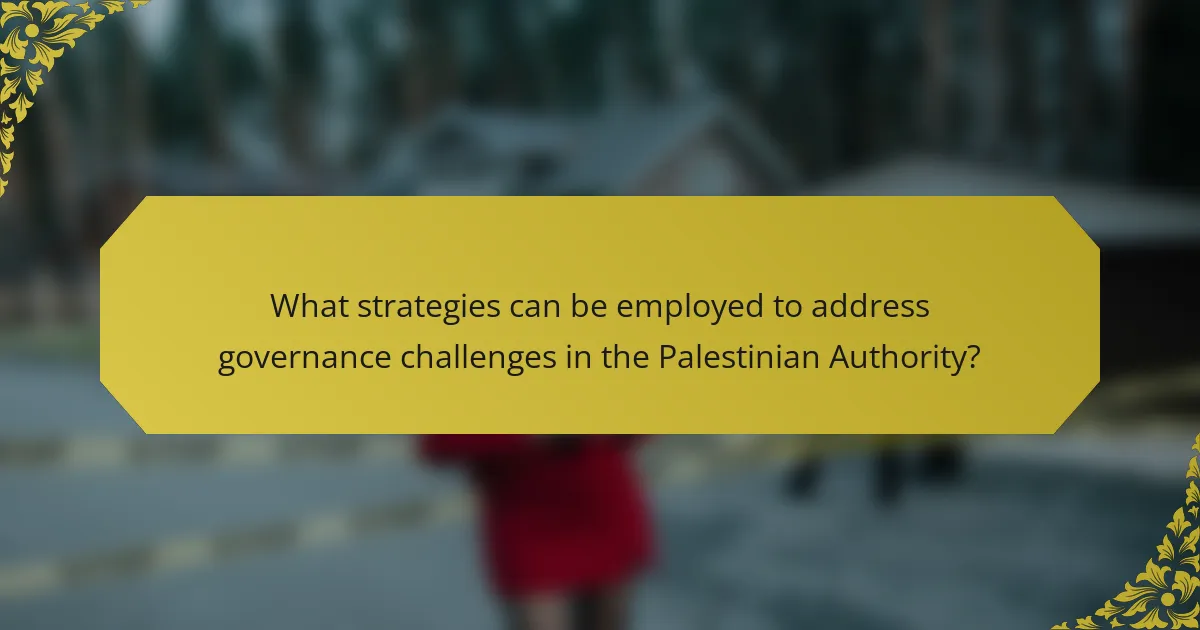
What strategies can be employed to address governance challenges in the Palestinian Authority?
Strengthening governance in the Palestinian Authority can be achieved through several strategies. Enhancing transparency in decision-making processes is crucial. This can build public trust and accountability. Implementing anti-corruption measures can reduce mismanagement of resources. Establishing independent oversight bodies can ensure adherence to governance standards. Promoting civic engagement allows citizens to participate actively in governance. Strengthening the rule of law is essential for maintaining order and justice. Capacity building for public institutions can improve service delivery. International partnerships can provide technical assistance and resources for governance reforms. These strategies collectively address existing challenges and improve governance effectiveness.
How can the Palestinian Authority enhance its legitimacy among citizens?
The Palestinian Authority can enhance its legitimacy among citizens by increasing transparency and accountability. Implementing democratic reforms can foster greater public trust. Engaging citizens in decision-making processes can create a sense of ownership. Strengthening public services, such as healthcare and education, can improve citizens’ quality of life. Addressing corruption through strict enforcement of anti-corruption laws can build credibility. Promoting human rights and freedoms can align governance with citizen expectations. Establishing effective communication channels can facilitate dialogue between the government and the public. These measures can collectively enhance the Palestinian Authority’s standing among its citizens.
What initiatives can foster greater public engagement and trust?
Initiatives that can foster greater public engagement and trust include transparent communication, community involvement, and accountability measures. Transparent communication involves sharing information openly with the public. This can be achieved through regular updates on governance activities and decision-making processes. Community involvement encourages citizens to participate in local governance. Initiatives like public forums and town hall meetings facilitate dialogue between authorities and citizens. Accountability measures ensure that government actions are subject to scrutiny. Implementing independent oversight bodies can enhance trust by holding officials accountable for their actions. Research shows that these initiatives can significantly improve public perception and trust in governance, as seen in various democratic societies.
How can the Palestinian Authority address grievances effectively?
The Palestinian Authority can address grievances effectively by enhancing communication with citizens. Establishing transparent channels for feedback is crucial. Regular town hall meetings can facilitate direct dialogue. Implementing a grievance redressal system will help track issues. Training officials on conflict resolution can improve responses. Engaging civil society organizations can provide additional support. Utilizing social media for outreach can increase accessibility. These measures can foster trust and improve governance.
What best practices from other regions can be applied to the Palestinian Authority’s context?
Decentralization of governance from regions like Brazil can be applied to the Palestinian Authority’s context. Brazil’s experience shows that empowering local governments improves service delivery. This approach can enhance accountability and responsiveness to citizens’ needs in Palestinian communities. Additionally, participatory budgeting practices from Porto Alegre can foster citizen engagement. This method allows residents to influence budget decisions directly. Such practices can strengthen democratic participation in the Palestinian Authority. Furthermore, anti-corruption measures implemented in countries like Georgia can serve as a model. Georgia’s reforms led to significant reductions in corruption levels. Adopting similar transparency initiatives could improve public trust in the Palestinian Authority. These best practices demonstrate that tailored governance strategies can address specific challenges faced by the Palestinian Authority.
What lessons can be learned from successful governance models elsewhere?
Successful governance models demonstrate the importance of transparency and accountability. For instance, countries like Sweden and New Zealand have high levels of public trust due to their open government practices. These nations prioritize citizen engagement in decision-making processes. This engagement fosters a sense of ownership among the populace. Additionally, effective resource management is crucial, as seen in Singapore’s efficient public services. Singapore’s focus on meritocracy in leadership selection enhances governance quality. Moreover, decentralization can empower local governments, allowing tailored solutions to regional issues. Countries like Germany exemplify the benefits of a federal system that balances power. Learning from these examples can guide the Palestinian Authority in addressing its governance challenges.
How can adaptive governance strategies be implemented in the Palestinian Authority?
Adaptive governance strategies can be implemented in the Palestinian Authority through stakeholder engagement and flexible policy frameworks. Engaging local communities fosters trust and collaboration. This can lead to more effective decision-making processes. Flexible policy frameworks allow for adjustments based on changing circumstances. The Palestinian Authority can utilize data-driven approaches to assess needs and outcomes. Incorporating technology can improve communication and transparency. Pilot programs can be tested to evaluate effectiveness before wider implementation. Continuous feedback mechanisms should be established to refine strategies over time. These steps can enhance resilience and responsiveness in governance.
What steps can be taken to build a more resilient governance framework?
To build a more resilient governance framework, stakeholders must prioritize transparency and accountability. Establishing clear communication channels fosters trust among citizens. Implementing regular audits can ensure financial integrity. Engaging civil society organizations enhances community involvement in governance. Training public officials in best practices strengthens institutional capacity. Adopting technology solutions can improve service delivery and data management. Encouraging inclusive policymaking ensures diverse perspectives are represented. These steps collectively contribute to a more robust and adaptive governance structure.
How can capacity-building initiatives strengthen governance structures?
Capacity-building initiatives can strengthen governance structures by enhancing skills and knowledge among leaders and institutions. These initiatives often focus on training programs that improve decision-making and policy implementation. They also promote transparency and accountability within governance frameworks. For instance, research shows that effective training leads to better resource management and service delivery. Additionally, capacity-building fosters collaboration among various stakeholders, including civil society and government entities. This collaboration can lead to more inclusive governance practices. Evidence from various countries indicates that strengthened governance structures result in improved public trust and participation. Overall, capacity-building initiatives play a crucial role in creating resilient and effective governance systems.
What role does education play in fostering effective governance?
Education plays a crucial role in fostering effective governance. It enhances citizens’ understanding of their rights and responsibilities. Educated individuals are more likely to participate in civic activities. This participation leads to increased accountability in governance. Moreover, education promotes critical thinking and informed decision-making. These skills are essential for evaluating government policies and actions. Studies show that higher education levels correlate with lower corruption rates. For instance, countries with better education systems often exhibit stronger democratic practices. Thus, education is fundamental in building a more effective and accountable governance framework.
The Palestinian Authority is the primary entity analyzed in this article, which examines its governance challenges and future prospects. Key issues include political fragmentation between factions like Fatah and Hamas, economic instability marked by high unemployment and dependency on foreign aid, and limited territorial control due to the Israeli occupation. The article further explores the implications of these challenges on policy implementation, public perception, and legitimacy, while also discussing potential reforms and strategies to enhance governance effectiveness. Additionally, it highlights the role of civil society and external factors in shaping the Authority’s governance landscape.
